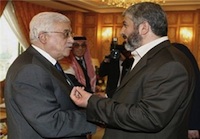
Palestinians said they had turned the page on division at a ceremony in Egypt to heal a four-year rift between the Fatah movement and the more militant group Hamas.
The deal calls for forming an interim government to run the occupied West Bank, where President Mahmoud Abbas is based, and Hamas-controlled Gaza Strip and prepare for parliamentary and presidential elections within a year.
The reconciliation is crucial to the formation of an independent state in the territories which Israel has allowed limited Palestinian self-rule.
“We announce to Palestinians that we turn forever the black page of division,” said Mr Abbas.
“We announce the good news from Egypt which has always carried its national and historical responsibility towards the Palestinian people. Four black years have affected the interests of Palestinians. Now we meet to assert a unified will,” he said.
Khaled Mashaal said his Hamas group wants the establishment of an independent, sovereign Palestinian state in the West Bank and Gaza Strip with Jerusalem as its capital.
“Our aim is to establish a free and completely sovereign Palestinian state on the West Bank and Gaza Strip, whose capital is Jerusalem, without any settlers and without giving up a single inch of land and without giving up on the right of return (of Palestinian refugees),” he said at the ceremony.
The ceremony, described as a celebration, was attended by representatives from the Arab League, Qatar, Oman and Arab members of the Israeli parliament.
In Hamas-controlled Gaza, university students distributed sweets, sang and rallied to mark the deal.
However, Israeli prime minister Benjamin Netanyahu denounced the deal and said his government would withhold tax revenues from the Palestinian Authority in the West Bank. He said Fatah must choose between Israel and Hamas, which he said was “an enemy of peace”.
Sinn Féin President Gerry Adams TD welcomed the agreement.
“This is an important development. It creates a unique opportunity for a real negotiation involving Palestinian and Israeli representatives to achieve a viable peace settlement,” he said.
“It is not without its difficulties and all sides must be prepared to take significant risks if progress is to be achieved.
“The initial response of the Israeli government has been disappointing.
“However, the political dynamic in the Middle East is changing. The agreement between Fatah and Hamas reflects this.
“The Israeli government needs to come to terms with the fact that the strategic interests of Israeli and Palestinian citizens is for peace. And that peace must encompass the security, prosperity and stability of the Israeli people and of the Palestinian people.”
BASQUE SOLIDARITY
The Basque Nationalist Party (PNV) has, in solidarity with fellow regional party Bildu, withdrawn support for the Spanish government. The Madrid government had banned Bildu from taking part in elections.
The Basque regional party PNV had been one of the minority Socialists’ main allies in the Madrid parliament over the past year.
But on Sunday the Supreme Court ruled that newly formed Bildu, which groups left-wing Basque independence parties, could not run in May 22nd municipal elections. It claimed some candidates’ had ties to previous “outlawed” parties which were in turn linked to armed separatist group ETA.
Party leader Inigo Urkullu said PNV was suspending all collaboration and support with the Madrid government over its hostility to Bildu, which he said led to the court ruling.
The Socialists passed their 2011 budget thanks to PNV backing, removing a huge political hurdle for prime minister José Luis Rodríguez Zapatero, who could otherwise have faced a call for early elections.
![[Irish Republican News]](https://republican-news.org/graphics/title_gifs/rn.gif)
![[Irish Republican News]](https://republican-news.org/graphics/title_gifs/harp.gif)

